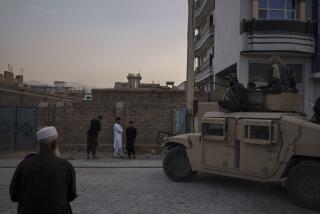Kurdish Leader Asks U.S. Pressure on Iraq : Ethnic strife: He also appeals for allied troops to remain until agreement is reached on autonomy.
- Share via
ISTANBUL, Turkey — Iraqi Kurdish leader Jalal Talabani called Monday for the United States to put pressure on Baghdad to drop major obstacles that he said are blocking progress in talks for a new autonomy agreement for Iraqi Kurdistan.
Talabani, leader of the Patriotic Union of Kurdistan, also appealed for U.S.-led allied troops to stay on in the security zone they created in northern Iraq in April until final agreement is reached with Iraqi President Saddam Hussein.
Talabani spoke to reporters in Istanbul on his first trip outside Iraq since civil conflict erupted there in the aftermath of the Persian Gulf War. He is due to address a gathering of the Socialist International in Istanbul today.
“There is no American pressure. Perhaps we are blaming them because they are not playing a part. They are still able to use their influence . . . for a just solution and agreement acceptable to both sides,” Talabani said.
Without a deal, Talabani warned, some of the half-million Kurdish refugees recently coaxed back to Iraq by the allies’ Operation Provide Comfort would simply flee back to the mountain camps on the Turkish border that the U.S. military closed last week.
The Kurds fear that if they are left unprotected, Hussein will crush them in the same way he crushed a Shiite Muslim rebellion in the south of the country.
Allied troops are steadily leaving northern Iraq. The force is down to about 18,000 from more than 21,000 at its peak on May 21, about half of those Americans.
Overall coordination of humanitarian relief efforts was handed over to the United Nations on Friday. The U.S. European Command in Stuttgart referred to the transfer as “a key milestone.”
However, a report issued the same day by the U.N. Disaster Relief Organization, the overall U.N. coordinator, said the Kurds who have returned to their homes are still plagued by “a sense of intense unease.”
Berham Salih, an aide to Talabani, said thousands of fearful Kurds have already fled their homes again after Arab-Kurdish clashes in parts of Iraqi Kurdistan not controlled by the allies. Several hundred thousand Kurdish refugees remain in Iran.
“People just don’t trust Saddam one bit,” Salih said.
In the town of Zakhu in northern Iraq, the Associated Press quoted military and other sources as saying the military occupation will end within two months. The sources, speaking on condition of anonymity, said American officials told aid workers over the weekend that the allied presence in Iraq will continue for “more than two weeks but less than two months.”
U.S. officials have set no official date for the pullout of American forces from the region.
Inside the security zone, Kurds marched again Saturday to the allied headquarters in Zakhu to beg the allies to stay on.
Talabani said there are two major obstacles blocking the Kurds’ talks with the Hussein regime, which started in Baghdad in mid-April, on the future of Iraq’s 3.5 million Kurds and an overall democratization of the country.
First, he said, Hussein is still insisting that any new Iraqi constitution be dictated by the ruling Baath Party and preserve the party’s leading role. Second, he said, the Iraqi leader refuses to include the key oil town of Kirkuk or several Iraq-Iran border towns in any Kurdish autonomous zone.
Talabani’s comments seemed to differ from a position taken by Masoud Barzani, the other major Iraqi Kurdish guerrilla leader. Barzani is conducting talks in Baghdad and recently said he expected a deal before June 20.
Talabani said he has no difference of opinion with Barzani but added that a full meeting of the Iraqi Kurdish leadership is an urgent priority.
Kurdish sources said Iraqi negotiators started dragging their feet after Gen. Colin L. Powell, chairman of the U.S. Joint Chiefs of Staff, said last month that the allies would withdraw from Iraq soon. “That did a lot of damage,” one said.
More to Read
Sign up for Essential California
The most important California stories and recommendations in your inbox every morning.
You may occasionally receive promotional content from the Los Angeles Times.










